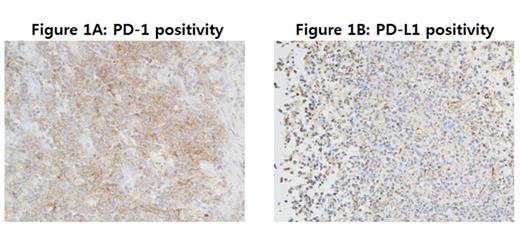Abstract
Background
Programmed cell death ligand 1 (PD-L1) is expressed on extranodal NK/T-cell lymphoma, nasal type (ENKL) tumor cells. The programmed cell death 1 (PD-1) and PD-L1 pathway inhibits host antitumor responses; however, little is known about how this pathway functions in ENKL. The aim of this study was to investigate the expression of PD-1 and PD-L1 and to determine the clinicopathological impact of PD-1 and PD-L1 positivity in ENKL.
Methods
We performed PD-1 and PD-L1 immunostaining in 79 ENKL biopsy samples and retrospectively analyzed medical records of all 79 patients from 4 tertiary referral hospitals. The demographic features, performance status, stage, LDH, primary sites, nodal sites, hemoglobin, white blood cell, platelet, creatinine, international prognostic index (IPI), and prognostic index for T-cell lymphoma (PIT) were recorded.
Results
The expression rates of PD-1-positive and PD-L1-positive ENKL were 7.6% and 88.6%, respectively (Figure 1A & 1B). PD-L1-negative ENKL (n=9) was significantly associated with high intermediate or high risk IPI (n=7, P=0.002) and group 3 or 4 PIT (n=6, P=0.043). Patients with PD-1-positive ENKL (n=6) had a trend toward better overall survival (OS) compared with that in patients with PD-1-negative ENKL (P = 0.090, Figure 2A). In contrast, there was no significant difference in OS between PD-L1-positive and -negative ENLK (P = 0.428, Figure 2B).
Conclusions
This is the first report describing the clinicopathological features and survival outcome according to expression of PD-1 and PD-L1 in ENKL. PD-1 expression rate is very low, and PD-L1 negativity is associated with poor risk groups of IPI and PIT in ENKL
Kim:Alexion Pharmaceuticals: Research Funding; Il-Yang: Research Funding; Celgene: Research Funding; Novartis: Research Funding.
Author notes
Asterisk with author names denotes non-ASH members.



This feature is available to Subscribers Only
Sign In or Create an Account Close Modal